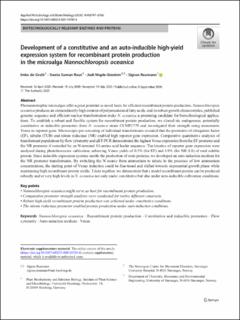| dc.contributor.author | de Grahl, Imke | |
| dc.contributor.author | Rout, Sweta Suman | |
| dc.contributor.author | Maple-Grødem, Jodi | |
| dc.contributor.author | Reumann, Sigrun | |
| dc.date.accessioned | 2023-02-13T14:43:26Z | |
| dc.date.available | 2023-02-13T14:43:26Z | |
| dc.date.created | 2020-11-18T14:46:54Z | |
| dc.date.issued | 2020-09 | |
| dc.identifier.citation | de Grahl, I., Rout, S.S., Maple-Grødem, J. &Reuman, S. (2020) Development of a constitutive and an auto-inducible high-yield expression system for recombinant protein production in the microalga Nannochloropsis oceanicaApplied Microbiology and Biotechnology, 104, 8747-8760. | en_US |
| dc.identifier.issn | 0175-7598 | |
| dc.identifier.uri | https://hdl.handle.net/11250/3050492 | |
| dc.description.abstract | Photoautotrophic microalgae offer a great potential as novel hosts for efficient recombinant protein production. Nannochloropsis oceanica produces an extraordinarily high content of polyunsaturated fatty acids, and its robust growth characteristics, published genome sequence and efficient nuclear transformation make N. oceanica a promising candidate for biotechnological applications. To establish a robust and flexible system for recombinant protein production, we cloned six endogenous, potentially constitutive or inducible promoters from N. oceanica strain CCMP1779 and investigated their strength using monomeric Venus as reporter gene. Microscopic pre-screening of individual transformants revealed that the promoters of elongation factor (EF), tubulin (TUB) and nitrate reductase (NR) enabled high reporter gene expression. Comparative quantitative analyses of transformant populations by flow cytometry and qRT-PCR demonstrated the highest Venus expression from the EF promoter and the NR promoter if extended by an N-terminal 14-amino acid leader sequence. The kinetics of reporter gene expression were analysed during photobioreactor cultivation, achieving Venus yields of 0.3% (for EF) and 4.9% (for NR::LS) of total soluble protein. Since inducible expression systems enable the production of toxic proteins, we developed an auto-induction medium for the NR promoter transformants. By switching the N source from ammonium to nitrate in the presence of low ammonium concentrations, the starting point of Venus induction could be fine-tuned and shifted towards exponential growth phase while maintaining high recombinant protein yields. Taken together, we demonstrate that a model recombinant protein can be produced robustly and at very high levels in N. oceanica not only under constitutive but also under auto-inducible cultivation conditions. | en_US |
| dc.language.iso | eng | en_US |
| dc.publisher | Springer Nature Switzerland AG | en_US |
| dc.rights | Navngivelse 4.0 Internasjonal | * |
| dc.rights.uri | http://creativecommons.org/licenses/by/4.0/deed.no | * |
| dc.subject | biologi | en_US |
| dc.subject | Nannochloropsis oceanica | en_US |
| dc.title | Development of a constitutive and an auto-inducible high-yield expression system for recombinant protein production in the microalga Nannochloropsis oceanica | en_US |
| dc.type | Peer reviewed | en_US |
| dc.type | Journal article | en_US |
| dc.description.version | publishedVersion | en_US |
| dc.rights.holder | © 2020 The Author(s). | en_US |
| dc.subject.nsi | VDP::Matematikk og Naturvitenskap: 400::Basale biofag: 470 | en_US |
| dc.source.pagenumber | 8747-8760 | en_US |
| dc.source.volume | 104 | en_US |
| dc.source.journal | Applied Microbiology and Biotechnology | en_US |
| dc.identifier.doi | 10.1007/s00253-020-10789-4 | |
| dc.identifier.cristin | 1849330 | |
| dc.relation.project | Norges forskningsråd: 226973 | en_US |
| cristin.ispublished | true | |
| cristin.fulltext | original | |
| cristin.qualitycode | 1 | |

